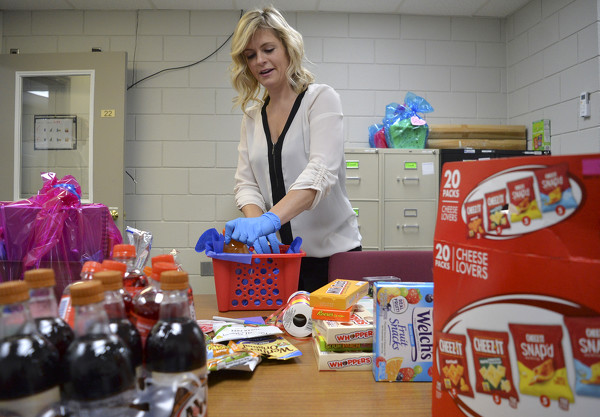Saturday, March 28th, 2020
A light in dark times
Board makes activity baskets for its clients
By Sydney Albert

Photo by Dan Melograna/The Daily Standard
Sam Fledderjohann of the Mercer County Board of Developmental Disabilities' peer support program packs an activity/gift basket on Thursday to help the board's clients cope with being at home due to Gov. Mike DeWine's stay-at-home order.
CELINA - The world may seem like it's been brought to a standstill, but the Mercer County Board for Developmental Disabilities is still working to provide services and bring a little cheer to locals with disabilities.
Many staff members are working remotely as they continue helping families get supplies or information, while direct-care providers continue to provide hands-on service.
"We haven't ceased anything, it's just a different way of doing things right now," said Melissa Kaup, an early intervention manager with the board.
Like virtually every other organization, the DD board has been affected by COVID-19 and the protocols outlined by health organizations and the state and federal governments.
The toughest thing has been the constant change, superintendent Shawn Thieman said. COVID-19 went from being a distant, overseas disease to something that has affected nearly every facet of life. At some point, information about COVID-19 seemed to change every few hours, which Thieman said made it almost impossible to lead any type of organization.
"It was like trying to bottle smoke," he said.
Yet much like everyone else, they are trying to adapt - and to give clients a ray of sunshine in the age of quarantine.
Some services such as Help Me Grow, an early intervention program geared toward parents of children with developmental delays or disabilities, are suspended, but staff are still contacting families remotely or dropping off supplies and information families might need, Kaup said.
Early intervention services are typically provided through home visits, offering physical and occupational therapy or whatever else families might need, Thieman said. Now, staff members and families are using videoconferencing services such as Zoom to conduct these visits.
Kaup said the video visits can feel different than an in-person visit, but parents are still able to show or share verbally what their children are doing and therapists are able to provide feedback.
Beth Gehret, a service and support administrator, said therapists are able to use the remote videoconference services to demonstrate activities they'd like parents to model for their kids.
"Some of the young parents, the young families that we serve, are probably more able and willing to adjust to trying the technology than maybe some of our older therapists … they've kind of been teaching us a little bit along the way, and it's been kind of neat to see how willing they are to use technology at a time like this," Thieman said. "Which I think might really benefit us in the future, too, because there's always times that people are sick or tough to get in touch with. It might be a neat opportunity."
For the adults with disabilities living in the community, the COVID-19-inspired changes have created larger challenges. Many have had their employment affected. While some small group activities can still happen, virtually all organized programs which they usually would have used have also been suspended.
"It's kind of rocked their world a little bit. They're used to having jobs, they're used to going to day services for support and social outings and just to have friendships and things like that during the day," Thieman said.
Caseworkers and direct-care providers are still working to ensure clients' needs are met, and Gehret said care providers have stepped up during these trying times. Whether it's helping with daily hygiene, medication or checking on mental health, providers are doing what they can.
Thieman said the DD board relies heavily on direct-care staff and realizes it's a trying time for them as well. It takes a big network of direct-care staff to serve the agency's clients - who typically number about 200, according to Thieman.
Yet even with their efforts, the change in daily life can still be jarring. While some of the board's clientele understand what's going on in response to COVID-19, others don't, Thieman said. All they know is they're not getting to see their friends and family like they used to, or that they're unable to follow their usual routines.
That's where goodie baskets come in. To lift the mood, staff members have been buying snacks, objects of interest to individuals or things for activities that can be done at home, and creating care packages.
After being assembled - with the use of gloves, of course - the baskets are dropped off on people's porches, complete with little notes that let the recipients know their friends from the agency have not forgotten them.

Photo by Dan Melograna/The Daily Standard
Mercer County Board of Developmental staff tucked a stuffed bunny into this basket also filled with pudding and cereal.

